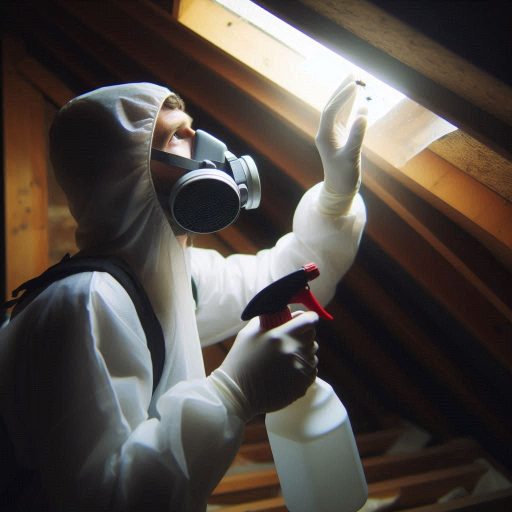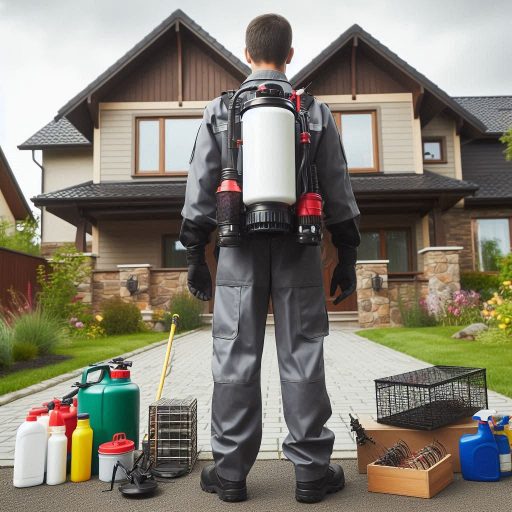Introduction
Essential skills for successful pest control workers are crucial to delivering effective and safe services.
Pest control requires more than just handling chemicals‘it demands technical knowledge, problem-solving abilities, and customer interaction skills.
Mastering these skills ensures pest control workers can identify infestations, apply treatments correctly, and maintain safety.
In an industry where health and property are at stake, these competencies help build trust and secure long-term client relationships.
Key Skills for Pest Control Success
- Attention to Detail: Identifying pests and infestation patterns quickly is essential.
- Technical Knowledge: Workers must understand chemicals, equipment, and safety protocols.
- Communication Skills: Explaining treatments and preventive measures helps clients stay informed.
- Problem-solving Abilities: Workers must develop effective strategies for complex pest problems.
- Physical Fitness: Handling equipment and working in challenging environments require stamina.
Why These Skills Matter
These skills enhance performance, ensure regulatory compliance, and improve safety for clients and technicians.
Skilled pest control workers also reduce risks by using eco-friendly solutions and ensuring minimal environmental impact.
Developing these essential skills ensures long-term success and client satisfaction in a competitive industry.
Knowledge of Pest Control Methods
Pest control workers must possess a thorough understanding of various pest control methods.
This knowledge forms the foundation for effective pest management strategies.
By learning the strengths and weaknesses of each method, workers can address pest problems more efficiently.
Methods Used in Pest Control
Chemical Methods
Chemical methods are among the most widely used pest control techniques.
These methods often involve pesticides designed to eliminate specific pests.
Pest control workers must understand the types of pesticides available, their active ingredients, and their modes of action.
For example, some pesticides attack the nervous system of insects, while others disrupt their growth and reproduction.
Workers should also be aware of the potential risks associated with chemical methods.
They must understand proper application techniques to minimize harm to non-target species, including humans and pets.
Using personal protective equipment (PPE) is essential when handling pesticides.
Knowledge of local regulations surrounding pesticide use is crucial as well.
Biological Methods
Biological methods use natural predators or pathogens to control pest populations.
These methods often involve introducing beneficial insects or microorganisms that prey on harmful pests.
For example, ladybugs can help control aphid populations, while parasitic wasps target caterpillars.
Pest control workers should know how to identify beneficial organisms and understand their role in the ecosystem.
They must also recognize the conditions that favor biological control methods.
Effective timing and proper placement are vital for success.
Understanding the life cycles of both pests and their natural enemies can enhance the effectiveness of these methods.
Physical Methods
Physical methods involve non-chemical techniques to manage pests.
These methods can include traps, barriers, and exclusion techniques.
For example, workers may use sticky traps to catch rodents or install screens to prevent insects from entering buildings.
Pest control workers should learn how to identify the appropriate physical methods for different pest problems.
They must understand how to set traps correctly and monitor them regularly.
Implementing exclusion techniques also requires knowledge of pest behavior and entry points.
Importance of Knowledge
Understanding when and how to use each pest control method effectively is critical for success.
Using the wrong method can exacerbate the problem or harm the environment.
Knowledgeable workers can select the most appropriate method based on the specific pest and situation.
Integrating multiple methods often yields the best results.
This approach, known as Integrated Pest Management (IPM), combines chemical, biological, and physical methods.
IPM emphasizes the importance of monitoring pest populations and making informed decisions.
Knowledge of pest control methods is vital for successful pest control workers.
By mastering chemical, biological, and physical methods, workers can address pest problems effectively and sustainably.
This knowledge enables them to protect public health, safeguard properties, and promote environmental stewardship.
Read: How to Balance Work and Personal Life in Childcare
Attention to Detail
In pest control, attention to detail is essential for delivering effective and lasting results.
Thorough inspections and treatments are key to eradicating infestations and preventing their return.
Overlooking even small details can compromise outcomes and lead to recurring pest problems.
Why Attention to Detail Matters in Pest Control
Thorough Inspections Detect Hidden Issues
- Some pests hide in tiny cracks or hard-to-reach places.
- Early signs, like droppings or gnaw marks, are easy to miss without careful observation.
Accurate Identification Prevents Mistakes
- Misidentifying pests can result in ineffective treatments.
- Each pest species requires specific solutions tailored to its behavior and habitat.
Precise Application of Treatments Is Essential
- Skipping certain areas may leave infestations partially untreated.
- Overuse or misuse of chemicals can harm the environment and waste resources.
Consequences of Overlooking Details
- Missed Entry Points: Small gaps or crevices can serve as gateways for future infestations.
- Recurring Infestations: Incomplete treatments allow pests to survive and multiply.
- Client Dissatisfaction: Ineffective control measures erode trust and damage reputation.
Best Practices for Pest Control Workers
- Use Checklists: Document each inspection step to ensure nothing is missed.
- Pay Attention to Environmental Changes: Seasonal shifts may affect pest activity.
- Follow Treatment Plans Exactly: Adhering to protocols ensures comprehensive control.
Detail-oriented pest control workers stand out by preventing recurring infestations and building client trust.
Focusing on small, often-overlooked signs can be the difference between success and failure.
A commitment to meticulousness ensures efficient, safe, and sustainable pest control solutions.
Read: Best Pet Grooming Schools in the United States
Transform Your Career Today
Unlock a personalized career strategy that drives real results. Get tailored advice and a roadmap designed just for you.
Start NowProblem-Solving Skills
Pest control workers face unique challenges daily.
Each job presents a new set of circumstances.
Creative problem-solving becomes essential in overcoming these challenges.
Workers must think critically and assess situations quickly.
They encounter various pests, environments, and client concerns, which require adaptable strategies.
Unique Challenges in Pest Control
Every pest control situation is different.
A worker may find an unexpected infestation in a client‘s home.
The pest might hide in hard-to-reach places.
This scenario demands quick thinking and immediate action.
Pest control workers often face multiple variables at once.
They must consider the safety of clients, pets, and the environment.
For example, a worker may arrive to treat a home for ants.
Upon inspection, they discover a wasp nest nearby.
The worker must adjust their approach to handle this unforeseen issue.
They may need to use different products and techniques.
Each decision impacts the effectiveness of their pest control strategy.
Thinking on Their Feet and Adaptability to Unexpected Situations
Successful pest control workers excel at thinking on their feet.
They can quickly analyze new situations and develop solutions.
This skill prevents potential problems from escalating.
A worker may encounter a client who is anxious about chemical exposure.
They must reassure the client while addressing the infestation.
Pest control workers frequently navigate unpredictable environments.
Weather changes, such as rain, can affect their plans.
They must be prepared to adapt their methods and timing.
For instance, a worker might need to reschedule a treatment due to heavy rain.
Instead of canceling the appointment, they can suggest alternative approaches.
Adaptability to Unexpected Situations
Adaptability is a crucial skill for pest control workers.
They often need to modify their techniques based on client needs and environmental factors.
A worker may find that their standard treatment isn‘t effective in a specific case.
This realization requires them to think creatively and try new methods.
Moreover, pest behavior can vary based on season and climate.
Workers must stay informed about these changes.
They adjust their strategies to maintain effectiveness throughout the year.
This adaptability not only enhances their service but also builds client trust.
Strong communication skills complement problem-solving abilities.
Workers must explain their strategies clearly to clients.
They must also listen to clients‘ concerns to address them effectively.
This collaboration fosters a sense of teamwork in resolving pest issues.
Workers often educate clients about preventative measures.
This approach helps minimize future infestations.
When workers convey information effectively, clients become more engaged.
Engaged clients tend to follow advice, leading to better outcomes.
Problem-solving skills play a vital role in pest control work.
Workers must navigate unique challenges and adapt quickly.
Their ability to think creatively allows them to tackle unexpected situations effectively.
By honing these skills, pest control professionals ensure successful outcomes for their clients.
Read: Steps to Become a Professional Pet Groomer in the USA

Communication Skills
Clear and effective communication stands as a crucial skill for pest control workers.
These professionals interact with clients, coworkers, and supervisors daily.
Strong communication fosters better understanding and enhances operational success.
It also significantly improves customer service and overall satisfaction.
Importance of Clear Communication with Clients, Coworkers, and Supervisors
Effective communication begins with clear interactions with clients.
Pest control workers must explain their services in an understandable manner.
When technicians articulate their methods and expectations, clients feel more informed.
This transparency reduces the likelihood of misunderstandings or confusion.
Clients appreciate knowing what to expect during pest control treatments.
Listening is equally important in client communication.
Technicians should actively listen to clients‘ concerns and specific pest problems.
By addressing these issues directly, workers demonstrate that they value client input.
This responsive approach builds trust and rapport, which are essential for lasting relationships.
Satisfied clients are more likely to return for future services and recommend the business to others.
Effective Communication with Coworkers
Strong communication among coworkers also plays a vital role in pest control operations.
Technicians often work in teams, making collaboration necessary for success.
Clear communication helps team members share information about ongoing projects.
For example, if one technician discovers an effective pest control method, they should share it with the team.
This practice enhances collective knowledge and improves service quality.
Moreover, open communication fosters a positive work environment.
When coworkers exchange ideas freely, they contribute to a culture of teamwork.
This culture boosts morale and encourages innovative problem-solving.
Technicians who feel comfortable communicating are more likely to share insights that can lead to improved operational efficiency.
Communicating with Supervisors
Communication with supervisors is equally essential for pest control workers.
Technicians should provide regular updates on their activities and any challenges faced.
Keeping supervisors informed allows for timely support and guidance.
When workers communicate effectively, supervisors can assist them in overcoming obstacles quickly.
Additionally, clear communication facilitates training and development.
Supervisors can identify areas where technicians excel or need improvement.
Providing targeted training opportunities enhances the workforce’s skills.
This growth benefits both the technicians and the overall business, leading to improved service delivery.
Impact on Customer Service and Pest Control Operations
Good communication significantly impacts customer service quality.
When pest control workers communicate clearly and effectively, clients feel valued and respected.
This positive interaction results in higher levels of customer satisfaction.
Satisfied clients are likely to leave positive reviews and recommend services to friends and family.
These referrals can lead to increased business and revenue.
Communication skills are essential for successful pest control workers.
Clear communication with clients builds trust and fosters strong relationships.
Effective communication among coworkers enhances teamwork and operational efficiency.
Strong interactions with supervisors promote ongoing training and development.
By prioritizing communication, pest control workers can provide exceptional customer service and ensure successful operations.
Read: Finding the Right Work-Life Balance as a Nail Tech
Physical Stamina and Endurance
Pest control work demands physical stamina and endurance.
Workers encounter various physical challenges daily.
They crawl into tight spaces, climb ladders, and carry heavy equipment.
These tasks require strength, flexibility, and resilience.
Employees who maintain good physical fitness perform these tasks more efficiently.
Let‘s explore the physical demands of the job and the importance of being in shape.
Physical Demands of the Job
Pest control workers often crawl in cramped areas, such as attics and basements.
These spaces may contain pests hiding in hard-to-reach locations.
Crawling requires agility and strength in the upper body.
If workers lack stamina, they may struggle to complete inspections.
This can lead to missed pest problems and dissatisfied clients.
Staying fit enables workers to navigate these tight spaces with ease and confidence.
Workers frequently climb ladders to reach high areas.
They may need to inspect roofs, ceilings, or high cabinets.
Climbing safely requires balance, coordination, and upper body strength.
A fit worker can climb quickly and safely, reducing the risk of falls.
Without sufficient stamina, workers may become fatigued, increasing the likelihood of accidents.
Regular physical training helps maintain the strength necessary for ladder work.
Pest control technicians transport heavy equipment and materials.
They might carry sprayers, traps, and other tools from their vehicles to job sites.
These items can weigh between 20 to 50 pounds.
Lifting and carrying heavy loads requires strong legs and a healthy back.
If workers lack endurance, they may struggle to carry equipment effectively.
This can lead to slower service and potential injuries.
Maintaining good physical shape prevents strain and supports productivity.
Importance of Being in Good Physical Shape
Being in good physical condition benefits pest control workers in many ways.
It enhances their ability to perform physical tasks without fatigue.
When technicians are fit, they can complete jobs efficiently and with precision.
Good health also reduces the risk of injuries during work.
Workers who exercise regularly build strength and endurance, making daily tasks easier.
Moreover, a physically active lifestyle improves overall well-being and reduces stress.
Physical stamina and endurance play vital roles in successful pest control work.
Crawling in tight spaces, climbing ladders, and carrying heavy equipment all demand a high level of fitness.
Being in good physical shape allows workers to perform their tasks more efficiently and safely.
Employers should encourage fitness initiatives and training programs to help workers maintain their health.
A fit workforce leads to better service, fewer injuries, and happier clients.
By prioritizing physical stamina and endurance, pest control workers ensure their success in the field.
Showcase Your Business Today
Reach thousands of readers actively exploring professional services. Publish your business profile and grow your audience now.
Publish NowSafety Awareness in Pest Control
Safety awareness is a critical skill for successful pest control workers.
This field often involves handling hazardous materials and pesticides.
Understanding the importance of safety protocols can prevent accidents and injuries.
Importance of Following Safety Protocols and Using of Protective Gear
Pest control workers must strictly follow safety protocols.
These guidelines protect workers from potential harm.
They outline safe procedures for handling chemicals and equipment.
Proper training helps workers recognize risks before they arise.
Following established safety protocols also ensures compliance with local regulations.
Each company should provide thorough training on safety procedures.
Workers should understand the correct usage of pesticides and equipment.
Proper training increases confidence in handling hazardous materials.
It also minimizes the chance of accidents in the workplace.
Regular safety audits reinforce the importance of following protocols.
These audits help identify areas needing improvement.
They ensure that workers adhere to safety guidelines consistently.
A culture of safety within a company promotes accountability and responsibility among staff.
Protective gear is essential in pest control work.
Workers should always wear appropriate personal protective equipment (PPE).
This equipment includes gloves, goggles, and respirators.
Each item serves a specific purpose in protecting the worker.
Wearing gloves prevents skin exposure to harmful chemicals.
Goggles protect the eyes from splashes or fumes.
Respirators filter out harmful airborne particles.
Together, these items reduce the risk of injury during pesticide application.
Employers must provide adequate protective gear to workers.
They should also ensure that workers understand how to use it correctly.
Regular training on PPE use can enhance safety awareness.
Workers should replace worn or damaged equipment immediately.
Potential Risks in Pest Control and How to Minimize Them
Pest control work involves several potential risks.
Exposure to harmful chemicals is a primary concern.
Accidental ingestion or inhalation can lead to serious health issues.
Additionally, physical injuries can occur from lifting heavy equipment or using power tools.
Awareness of these risks is crucial for pest control workers.
They must learn to recognize hazardous situations.
Proper planning and training can help minimize these risks.
To minimize risks, workers should follow safety protocols diligently.
They should read labels and safety data sheets for all chemicals used.
This information provides vital details on safe handling and emergency procedures.
Workers should also maintain a clean and organized workspace.
Clutter can lead to accidents and injuries.
By keeping the area tidy, workers can move freely and safely.
Furthermore, using proper techniques can reduce the risk of exposure.
For instance, using bait stations limits contact with pesticides.
Training in these methods enhances safety awareness among workers.
Safety awareness is vital for pest control workers.
Following safety protocols and using protective gear significantly reduce risks.
Understanding potential hazards and implementing safety measures creates a safer work environment.
By prioritizing safety, pest control workers can protect themselves and others while effectively managing pest issues.
Time Management Skills
Effective time management stands as a critical skill for pest control workers.
These professionals face a variety of tasks daily.
They must prioritize work, manage schedules, and meet deadlines consistently.
Understanding how to allocate time wisely impacts both efficiency and customer satisfaction.
The Need to Prioritize Tasks, Managing Schedules Effectively and Meeting Deadlines
Pest control workers often juggle multiple tasks.
They might respond to urgent service requests while maintaining regular maintenance schedules.
Prioritizing these tasks ensures that they address the most pressing issues first.
For example, a serious infestation requires immediate attention over a routine check.
By ranking tasks based on urgency and importance, workers can focus their efforts where they matter most.
Creating and adhering to a schedule proves vital for pest control workers.
They can map out daily routes, allocate sufficient time for each job, and minimize travel time.
When workers plan their schedules efficiently, they can fit more jobs into a single day.
This approach not only boosts productivity but also improves service delivery.
In pest control, meeting deadlines directly influences customer satisfaction.
Clients expect timely service, especially during pest emergencies.
When workers manage their time well, they can complete jobs within the promised timeframe.
Failing to meet deadlines can lead to frustrated customers and lost business opportunities.
Boosting Productivity and Enhancing Customer Satisfaction Through Efficient Time Management
Efficient time management results in higher productivity levels for pest control workers.
By focusing on task prioritization and effective scheduling, they accomplish more in less time.
This productivity benefits the company as well as the employees.
When workers feel accomplished, they are more motivated and engaged in their tasks.
Moreover, increased productivity allows pest control workers to take on more clients.
A satisfied customer base can lead to repeat business and referrals.
Thus, time management contributes to overall success and growth for the business.
Time management plays a significant role in enhancing customer satisfaction.
When pest control workers complete tasks efficiently, clients appreciate the prompt service.
Satisfied customers are more likely to share their positive experiences.
They can help build a good reputation for the pest control company.
Additionally, timely communication with customers is crucial.
Informing clients about arrival times and job progress fosters trust and transparency.
When workers manage their time effectively, they can keep customers updated without delays.
This proactive approach strengthens relationships and boosts overall satisfaction.
Time management skills are essential for successful pest control workers.
Prioritizing tasks, managing schedules, and meeting deadlines contribute to increased productivity and customer satisfaction.
By honing these skills, workers can enhance their performance and elevate the service they provide.
Mastering time management leads to long-term success in the pest control industry.
Find Out More: Balancing Cash as a Bank Teller
Continuous Learning and Professional Development
Continuous learning and professional development play a crucial role in the success of pest control workers.
The pest control industry constantly evolves due to new technologies, methods, and regulations.
Workers must stay informed about these changes to remain effective in their roles.
Embracing continuous learning ensures that pest control workers maintain their competitive edge.
Stay Up-to-Date on Industry Trends, Technologies and Techniques
Pest control workers should actively seek information about the latest industry trends.
They can do this through online resources, industry publications, and trade shows.
Joining professional associations also helps workers access valuable information and networking opportunities.
Engaging with peers and experts allows workers to share insights and experiences.
Utilizing social media platforms can also enhance learning.
Workers can follow industry leaders, organizations, and relevant hashtags.
This connection keeps them informed about new products, techniques, and regulations.
By staying engaged, pest control workers can adapt their practices accordingly.
Technology continuously reshapes the pest control landscape.
Workers should learn about the latest tools and equipment that enhance efficiency and effectiveness.
Many companies now use software for scheduling, inventory management, and customer communications.
Familiarizing themselves with these tools can streamline operations and improve customer service.
Additionally, pest control workers should explore advancements in pest management techniques.
Integrated pest management (IPM) focuses on environmentally friendly solutions.
Understanding IPM principles can lead to better pest control outcomes and client satisfaction.
Benefits of Ongoing Training and Certification Opportunities
Ongoing training provides numerous benefits for pest control workers.
First, it enhances their knowledge and skills, leading to improved job performance.
Workers who invest in their professional development often see an increase in job satisfaction.
This satisfaction stems from a sense of accomplishment and the ability to tackle complex pest issues.
Second, ongoing training and certifications can lead to career advancement.
Employers value workers who demonstrate a commitment to learning and growth.
Pursuing certifications from recognized organizations can elevate a worker‘s credibility in the field.
Certifications also increase the likelihood of promotions and salary increases.
Various certification programs exist for pest control workers.
Organizations such as the National Pest Management Association (NPMA) offer training and certification programs.
These programs cover essential topics such as safety, regulations, and pest biology.
Completing these certifications demonstrates a worker‘s expertise and commitment to the profession.
Moreover, many states require continuing education credits for license renewal.
This requirement encourages workers to participate in ongoing training.
Staying current with regulations and best practices helps workers comply with industry standards.
Encouraging continuous learning and professional development benefits both pest control workers and their employers.
By staying informed about industry trends, embracing new technologies, and pursuing ongoing training, workers enhance their skills and career prospects.
A commitment to learning ultimately leads to increased job satisfaction and successful pest control practices.
Conclusion
Successful pest control workers possess key skills essential for their careers.
Strong communication skills enable them to explain treatments clearly to clients.
Problem-solving abilities allow them to address diverse pest issues effectively.
Technical knowledge helps them understand pest behavior and treatment methods.
Moreover, attention to detail ensures they apply the right solutions without harming the environment.
Physical stamina and dexterity support workers as they navigate various job sites.
Customer service skills enhance client relationships and build trust.
Fostering a commitment to continuous learning keeps pest control professionals updated on industry trends.
Embracing technology and tools can improve efficiency and effectiveness in their work.
To excel in your pest control career, focus on developing these essential skills.
Invest time in training and education to strengthen your expertise.
Engage with mentors and peers to share experiences and insights.
By honing your skills, you will improve your job performance and increase your career opportunities.
Embrace these challenges and opportunities for growth.
With dedication and effort, you can become a successful pest control worker.
[E-Books for Sale]
The Big Book of 500 High-Paying Jobs in America: Unlock Your Earning Potential
$19.99 • 500 High-Paying Jobs • 330 pages
Explore 500 high-paying jobs in America and learn how to boost your career, earn more, and achieve success!
See All 500 High-Paying Jobs of this E-Book
1001 Professions Without a Degree: High-Paying American Jobs You Can Start Now
$19.99 • 1001 Professions Without a Degree • 174 pages
Discover 1001 high-paying jobs without a degree! Unlock career tips, skills, and success strategies for just $19.99!




